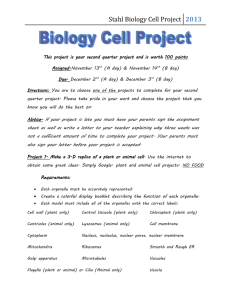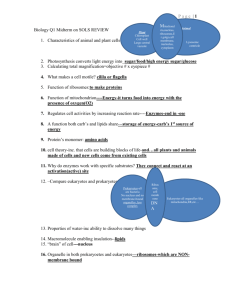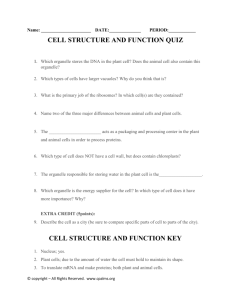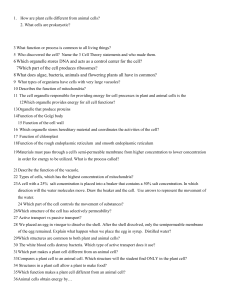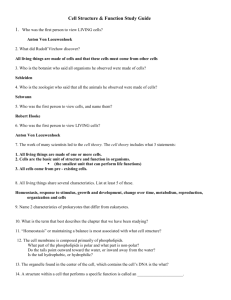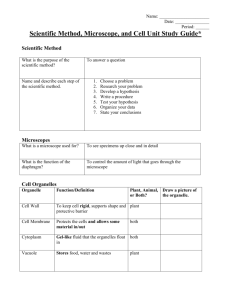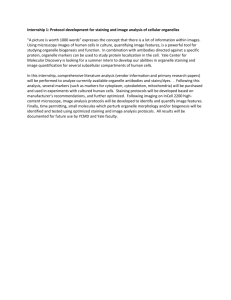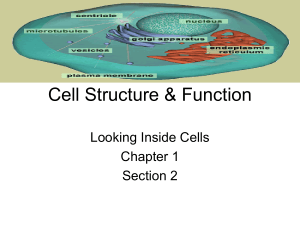Notes on Organelles!!
advertisement
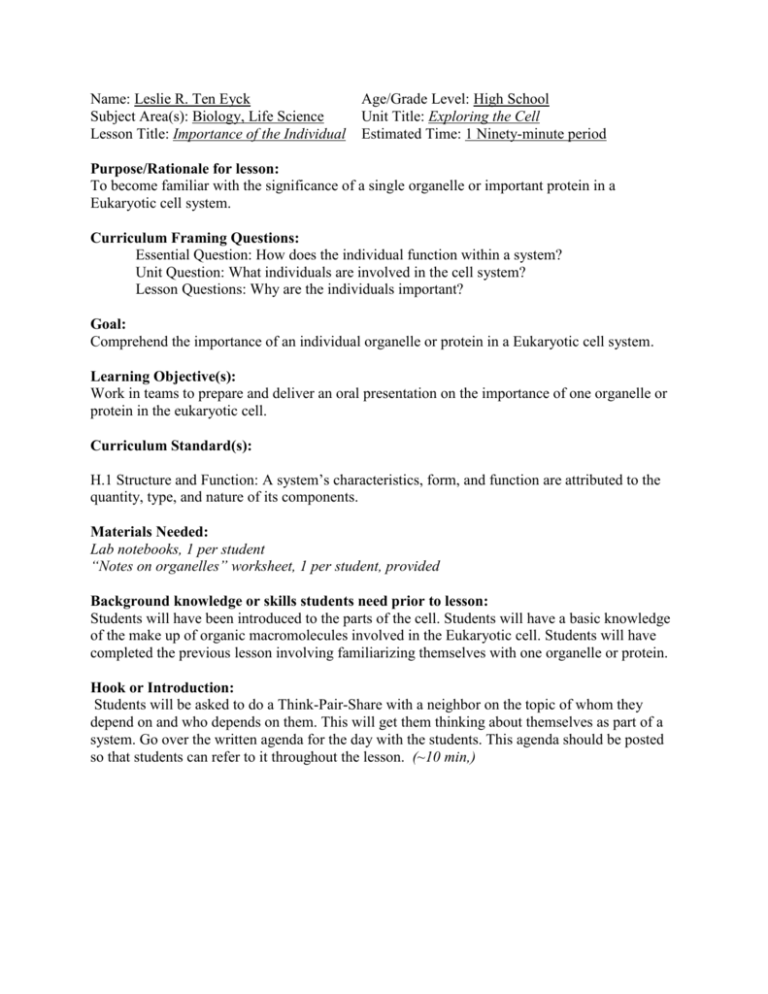
Name: Leslie R. Ten Eyck Subject Area(s): Biology, Life Science Lesson Title: Importance of the Individual Age/Grade Level: High School Unit Title: Exploring the Cell Estimated Time: 1 Ninety-minute period Purpose/Rationale for lesson: To become familiar with the significance of a single organelle or important protein in a Eukaryotic cell system. Curriculum Framing Questions: Essential Question: How does the individual function within a system? Unit Question: What individuals are involved in the cell system? Lesson Questions: Why are the individuals important? Goal: Comprehend the importance of an individual organelle or protein in a Eukaryotic cell system. Learning Objective(s): Work in teams to prepare and deliver an oral presentation on the importance of one organelle or protein in the eukaryotic cell. Curriculum Standard(s): H.1 Structure and Function: A system’s characteristics, form, and function are attributed to the quantity, type, and nature of its components. Materials Needed: Lab notebooks, 1 per student “Notes on organelles” worksheet, 1 per student, provided Background knowledge or skills students need prior to lesson: Students will have been introduced to the parts of the cell. Students will have a basic knowledge of the make up of organic macromolecules involved in the Eukaryotic cell. Students will have completed the previous lesson involving familiarizing themselves with one organelle or protein. Hook or Introduction: Students will be asked to do a Think-Pair-Share with a neighbor on the topic of whom they depend on and who depends on them. This will get them thinking about themselves as part of a system. Go over the written agenda for the day with the students. This agenda should be posted so that students can refer to it throughout the lesson. (~10 min,) Procedures: Organelle debate: Students will work in teams, consisting of classmates assigned the same organelle or protein in the previous lesson, to develop an oral presentation defending the importance of that organelle/protein in the proper function of the cell. Students will be given the following prompt: The Big Cell Corporation has recently had to make some budget cuts and needs to lay off some of its staff. Prepare a defense for your organelle or protein to present to the review board for the Big Cell Corporation. Work with your team mates to come up with three main points defending the importance of your organelle or protein in the cell’s function. Each team will be required to create a presentation of their argument; for this portion each student must present one of the main points your team decided on. In other words: EVERYONE MUST TALK! Specifications: - Each team will have 3 minutes to present and 1 minute for questions - Each team member needs to present a different point - All three of your group’s main points need to be recorded in your personal lab notebooks. - After all groups have presented we will vote on which organelle had the most convincing argument. To increase participation in this activity, each student will draw an organelle at random and be asked to write one question in their lab notebook that they will ask the team defending that organelle’s importance. The instructor should keep a record of which organelle each student drew in order to ensure that all students ask their questions at appropriate times and that all students are participating. Students will also be asked to complete a “Notes on organelles” worksheet in order to encourage engagement and as a resource for the next activity. (~ 20 min. to prepare, ~50 min. to present, H.1.) Differentiation/Accommodation: These activities provide opportunities for writing, group collaboration, individual work, and public speaking. This allows the students to communicate comprehension in several manners. To ensure greatest level of comprehension and cooperation the instructor should assign the organelles/proteins carefully based on cognitive ability, familiarity with the material, relations between the students, and literacy levels. A posted agenda will also be helpful for students requiring accommodation. Students diagnosed with ADHD or other learning disorders should be paired with students that are familiar with the material and have shown the ability to be patient. Also, students should always have the option to have an exit conversation as opposed to an exit slip. This allows students that are not as comfortable with writing to communicate their comprehension and maintain a valued opinion. Attention to Literacy: By requiring that students record their arguments and questions in their lab notebook and that they fill out a notes sheet, the lesson will provide opportunities for the students to practice their writing skills without making the writing too laborious. Students with low literacy levels should be paired with students with high literacy levels to ensure that the students have the guidance required for the writing activities. Closure: To close this activity students will be asked to submit exit slips on which organelle they thought had the most convincing argument and one thing they learned from that presentation. Some students may be more comfortable simply telling you who they thought had the best argument. This is a perfect opportunity for differentiation for students with a low-literacy level. (~10 min.) Assessment and Evaluation of Student Learning: Students will be evaluated on completion of assigned writings including 3 defenses for their organelle and one question for an organelle they did not research. Students will also be evaluated on their presentation of the importance of their organelle and the strength of their arguments. This will allow the students to demonstrate that they comprehend the function and importance of the organelle they researched. Assessment Page: “Big Cell Corporation” Name:_______________________ 3 points defending the importance of your organelle, recorded in lab notebook: Points possible: 9 Points earned: ________ 1 question about an organelle you didn’t research, recorded in lab notebook: Point possible: 5 Points earned: _______ Completion of “Notes on Organelles” worksheet: Points possible: 5 Points earned: ________ Grading Rubric for Organelle Presentation 1 2 3 4 Adequately explains the function of the organelle/protein. Shows no comprehension of the function of the organelle Shows some comprehension of the function of the organelle Shows adequate comprehension of the function of the organelle Clearly defines the function of the organelles Provides strong support for the importance of the organelle in the cell system. Shows no comprehension of the importance of the organelle Shows some comprehension of the importance of the organelle Shows adequate comprehension of the importance of the organelle Clearly defines the importance of the organelle Demonstrates the relationship between the organelle and other organelles. Shows no comprehension of the relationship between organelles Shows some comprehension of the relationship between organelles Shows adequate comprehension of the relationship between organelles Clearly defines the relationship between organelles in focus Presentation is well organized and delivered confidently with clear voice. Little to no organization, delivery is unclear or unconfident Some organization and some clarity and confidence Adequate organization, clarity and confidence in delivery Well organized, demonstrates confident delivery and clear voice Total Points Possible: 30 Total Points Earned: _________ Points Earned Notes on Organelles!! Organelle Name: What does this organelle do? Nucleus & Nucleolus Does your organelle depend on this organelle? Does this organelle depend on your organelle? One thing you didn’t know about this organelle: Notes: Organelle Name: Endoplasmic Reticulum (ER) & Ribosomes What does this organelle do? Does your organelle depend on this organelle? Does this organelle depend on your organelle? One thing you didn’t know about this organelle: Notes: Organelle Name: What does this organelle do? Does your organelle depend on this organelle? Does this organelle depend on your organelle? One thing you didn’t know about this organelle: Notes: Chloroplast Organelle Name: What does this organelle do? Motor Proteins Does your organelle depend on this organelle? Does this organelle depend on your organelle? One thing you didn’t know about this organelle: Notes: Organelle Name: What does this organelle do? Cytoskeleton & Centrosome Does your organelle depend on this organelle? Does this organelle depend on your organelle? One thing you didn’t know about this organelle: Notes: Organelle Name: What does this organelle do? Does your organelle depend on this organelle? Does this organelle depend on your organelle? One thing you didn’t know about this organelle: Notes: Cell Wall Organelle Name: What does this organelle do? Golgi Apparatus Does your organelle depend on this organelle? Does this organelle depend on your organelle? One thing you didn’t know about this organelle: Notes: Organelle Name: What does this organelle do? Vesicles Does your organelle depend on this organelle? Does this organelle depend on your organelle? One thing you didn’t know about this organelle: Notes: Organelle Name: What does this organelle do? Does your organelle depend on this organelle? Does this organelle depend on your organelle? One thing you didn’t know about this organelle: Notes: Lysosome & Peroxisome Organelle Name: What does this organelle do? Plasma Membrane Does your organelle depend on this organelle? Does this organelle depend on your organelle? One thing you didn’t know about this organelle: Notes: Organelle Name: What does this organelle do? Cell Wall Does your organelle depend on this organelle? Does this organelle depend on your organelle? One thing you didn’t know about this organelle: Notes: Organelle Name: What does this organelle do? Does your organelle depend on this organelle? Does this organelle depend on your organelle? One thing you didn’t know about this organelle: Notes: Membrane-bound Proteins
